Marine Life & Conservation
Glasgow Uni students research under the Red Sea at Roots
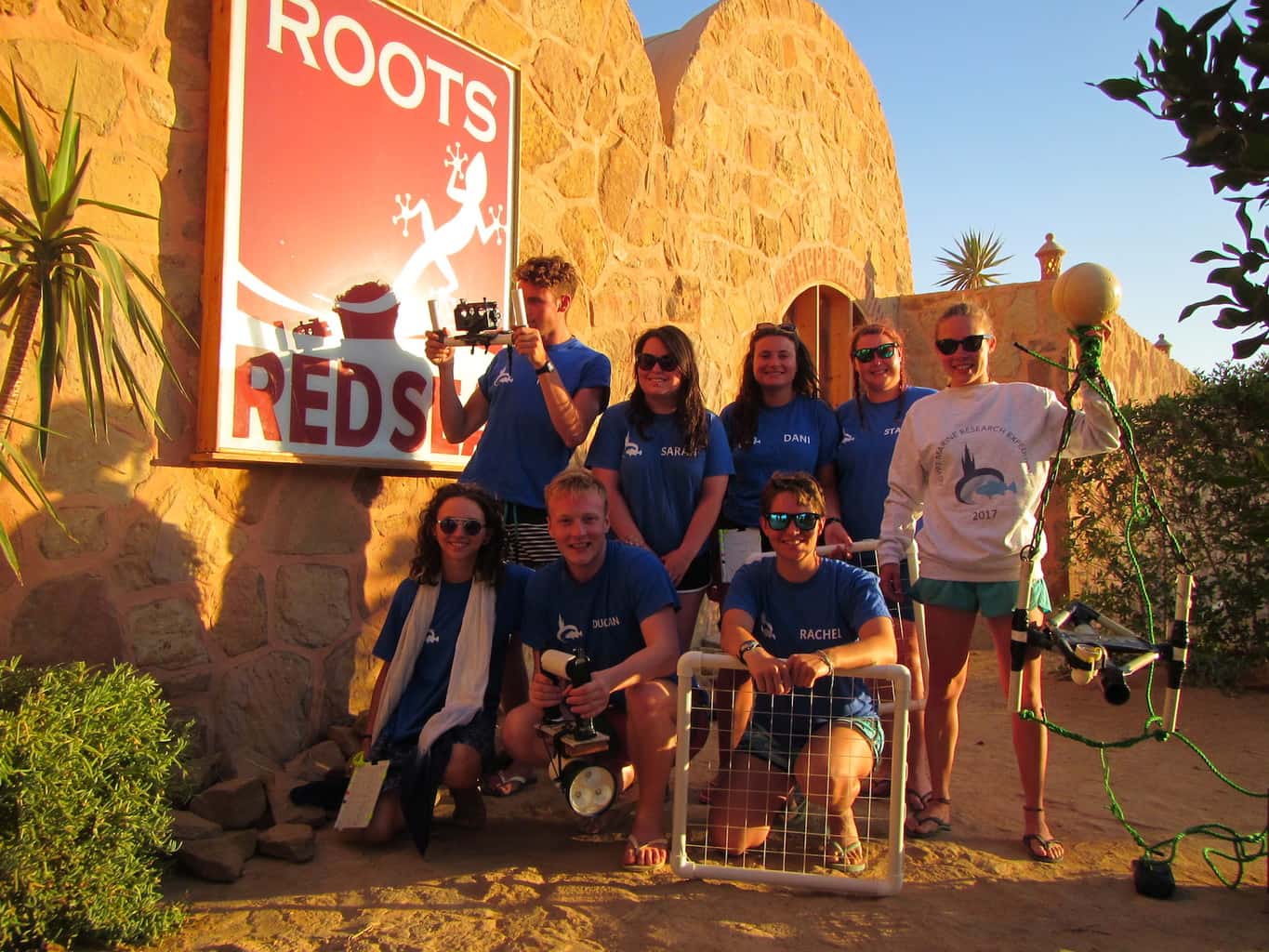
Our new blogger, Guy Henderson, reports on this summer’s undergraduate research expedition at the Open Ocean Science Centre at Roots Camp, El Quseir, Egypt…
June and July are busy months for science at Roots Camp and Pharaoh Dive Club El Quseir. This is when the annual University of Glasgow marine research expedition is based on site at the Open Ocean Science Centre. The students will be here until the end of July undertaking fieldwork for dissertations and doing data analysis in the purpose built marine lab. The team consists of eight members painstakingly selected way back in October. They have spent the last 8 months designing projects, applying for grants, fundraising and honing their diving skills. There is a good range of experience within the team with one first year, two second years, a fourth year (recently graduated) and four third year honours students. The third years will be collecting data for their dissertations and each have been assigned a buddy from the remaining team members to help with data collection.
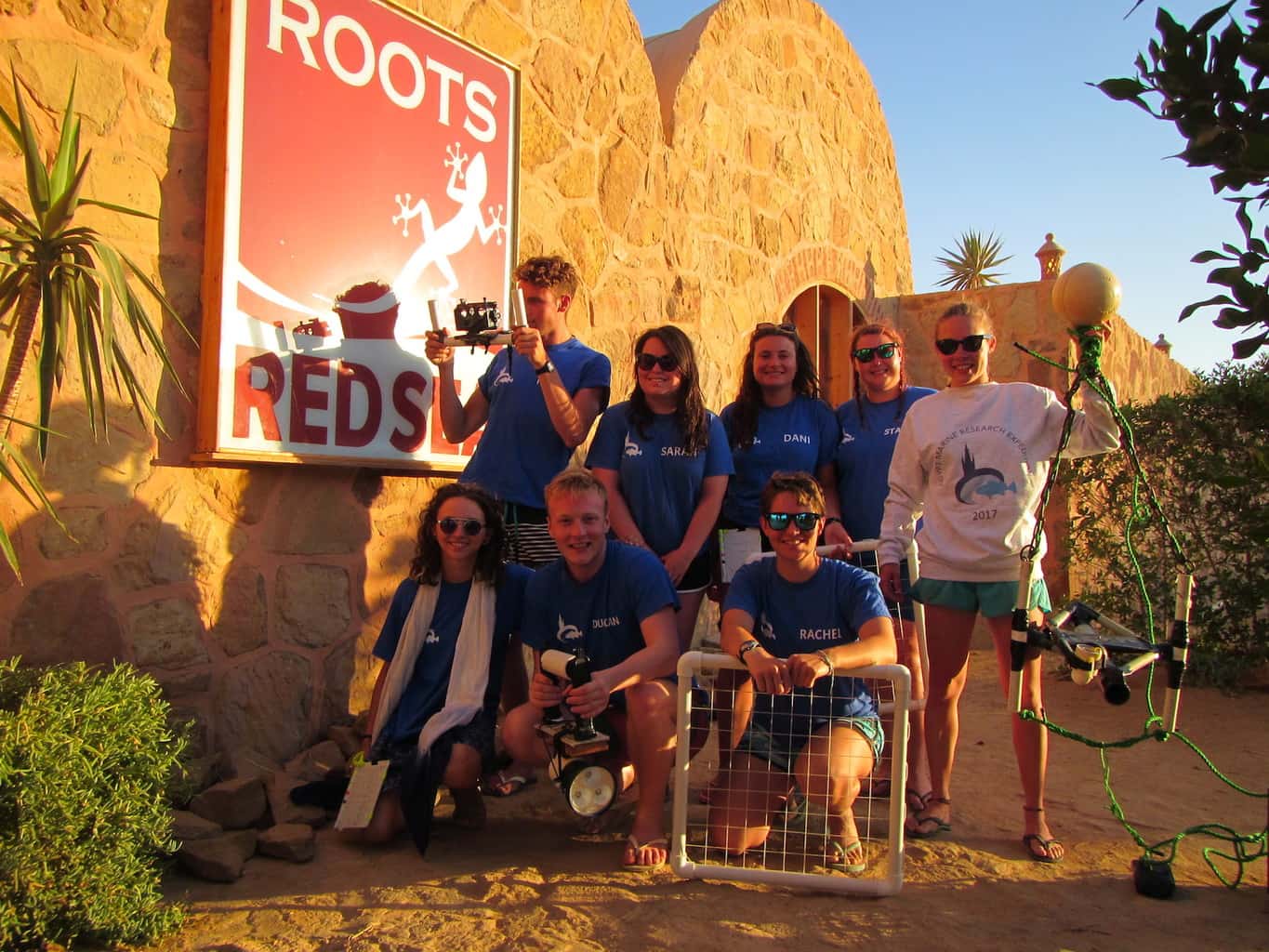
GU Egypt Marine Expedition 2017: Left to Right, Back to Front – Max, Sarah, Dani, Stacey, Bella, Clara, Duncan & Rachel
Pilot studies and equipment familiarisation went without a hitch and the projects are all well underway with a substantial amount of data already collected. Below we will introduce the individual project methodologies and scientific relevance. We have two diving projects which are undertaken by members with diving qualifications at rescue level or higher, a shore based project on the reef flat and a rather exciting camera drop project which makes use of the speedboat.
Bella & Sarah – Camera drops in the mesophotic zone
Bella is investigating arguably the most mysterious of reef habitats; Mesophotic Coral Ecosystems (MCEs). Ranging in depths from 30 to 150 metres, MCEs receive enough light penetrating the surface waters for vibrant life but are generally too deep for traditional scuba diving techniques so are vastly understudied in comparison to shallow reefs. Round the globe there are gaps in our knowledge but particularly in the Red Sea, where the diverse marine life has yet to be fully charted on the map of scientific research.
Bella is using an innovative technique to capture footage of fish at varying depths within the MCE range. She is doing this by dropping a 3D camera off an RIB at GPS marked co-ordinates, 75-degree bearings from the shore, at depth level increments of roughly 10 metres. The footage will be used to identify and count all the fish found at each depth level as well as measure their biomass using EventMeasure software. Guy and her have been working hard on the construction of an intricate rig structure to protect the camera in the water, which will be essential to the effective success of the drops.
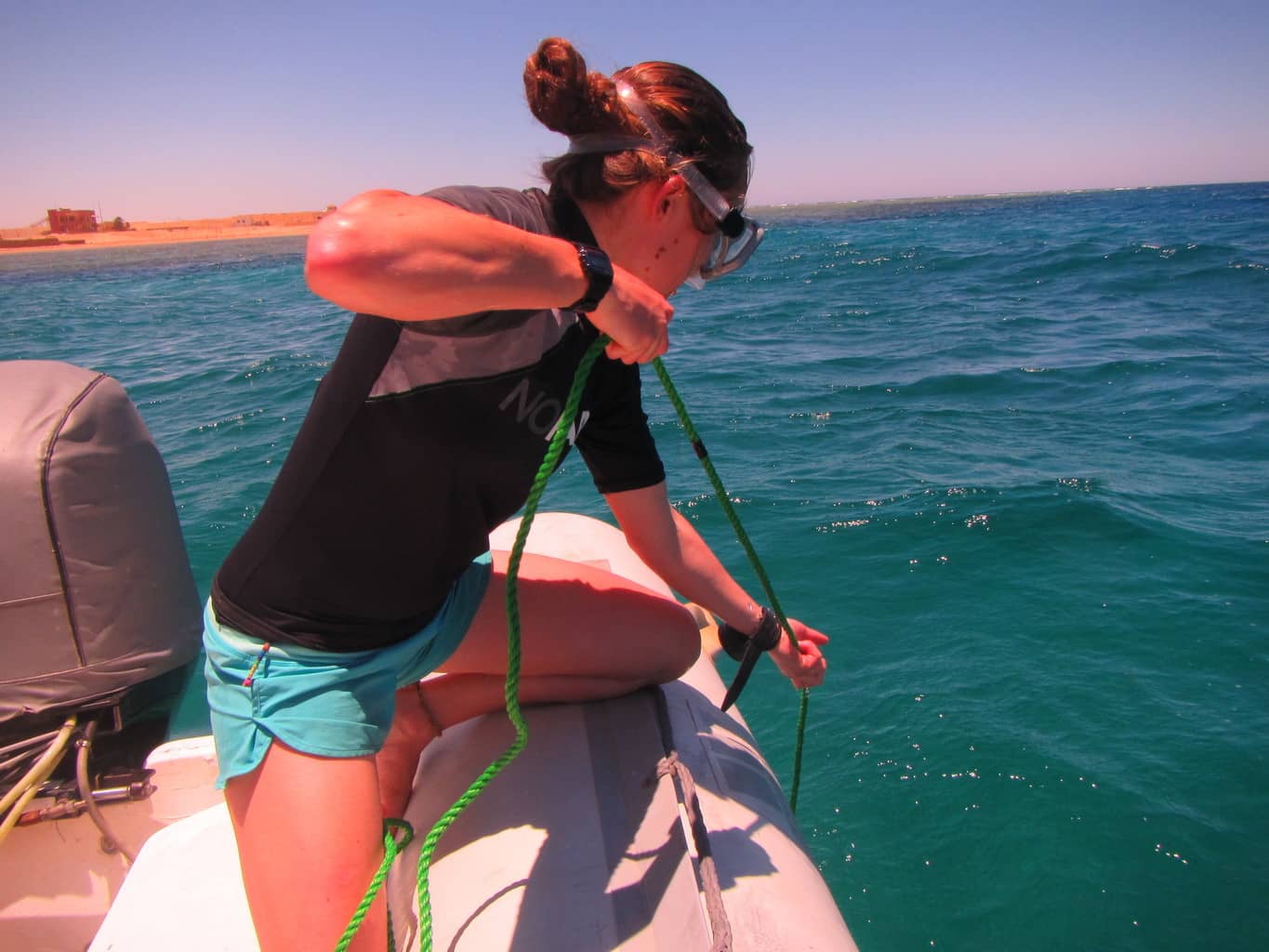
Bella deploying her 3D drop camera rig at Ras Quseir
Duncan & Rachel – Coral cover and light intensity
Duncan will be quantifying the effect of Photosynthetically active radiation (PAR) on the community structure of scleratinian (Hard) corals on the Abu Sautir reef. Understanding the impact differing PAR levels have on coral abundance and diversity will indicate the importance of light as an abiotic driver of coral community composition. Coupled with the lack of research and relevant literature in the Red Sea, Duncan’s study will provide valuable data relating to coral cover of a highly diverse yet relatively understudied Red Sea fringing reef.

Duncan filming a video transect with a custom camera mount
Clara & Stacey – Reef flat, rock pool diversity
Clara is investigating how factors such as distance from the shore, pH and salinity affect species diversity within the rock-pools in Abu Sautir. This is done by creating transects on the shore and using quadrat sampling to determine the species diversity and abundance. Rock-pools are found in intertidal habitats which may be extreme environments for inhabiting organisms; this is due to tidal changes, rough wave action and fluctuating water parameters. Some organisms have physiological coping mechanisms that help them survive the fluctuation in these conditions, such as starfish which can regulate their salt uptake. However those that are less well adapted to these variable conditions may not be found across the entire range of rock-pools, therefore it will be interesting to discover how the various species are distributed across the reef flat.
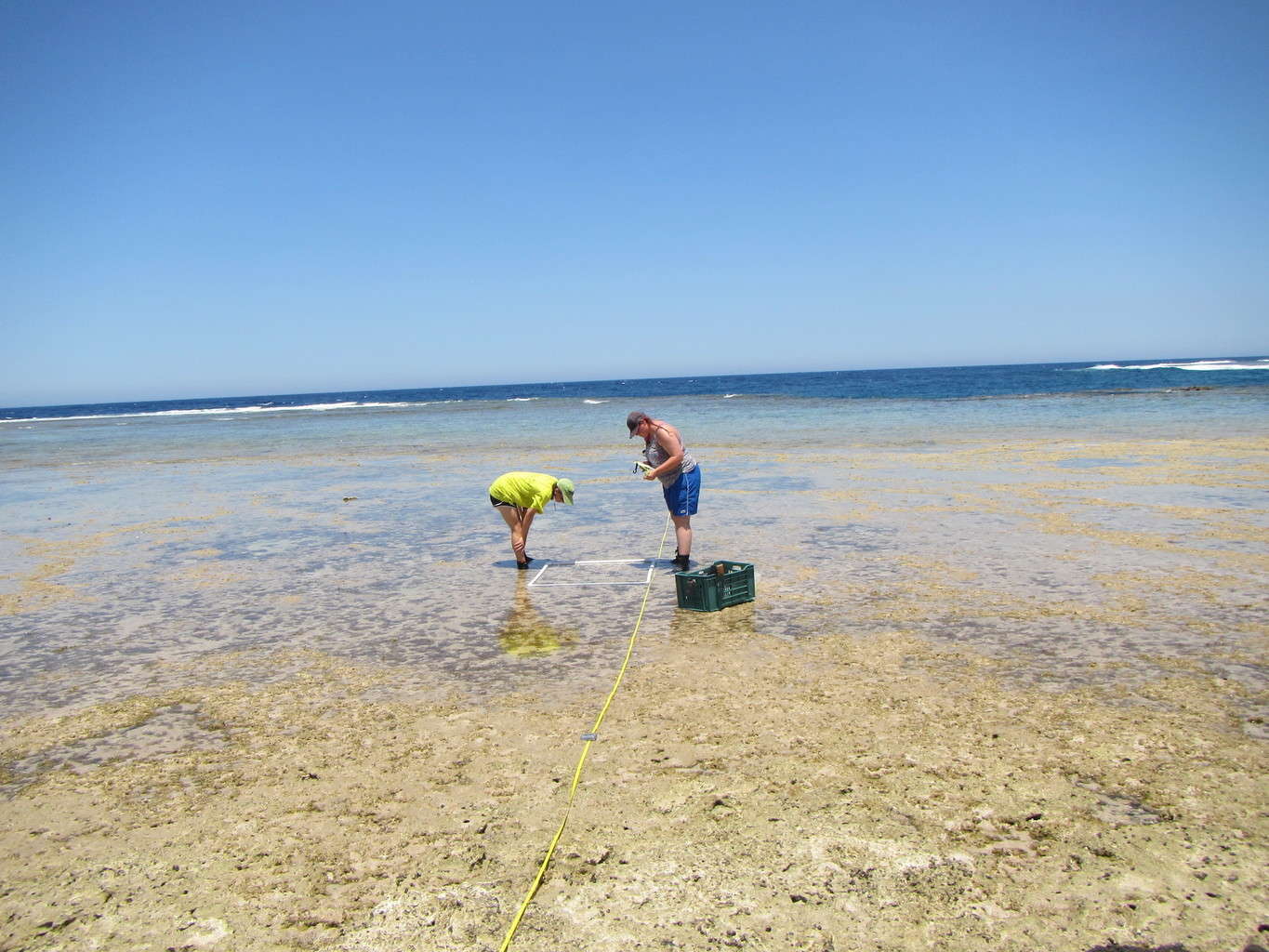
Clara and Stacey surveying a quadrat on the house reef Abu Sautir
Max & Dani – Hawkfish behaviour study
Max will be working on our longest running project by supplementing a 3 year data set. The hawkfish behaviour study aims to look at bold-shy behaviour of freckled hawkfish (Paracirrhites forsteri) in relation to mortality rates from year to year. Using 3D camera technology and photo identification software, the relative boldness of individual fish can be found and calculated by means of a simulated predator prey interaction. Animal behavioural studies are usually limited to lab settings with controlled conditions; this project is exciting as it allows us to look at the behaviour of fish in their natural habitats while investigating traits that may contribute to the evolution of populations.
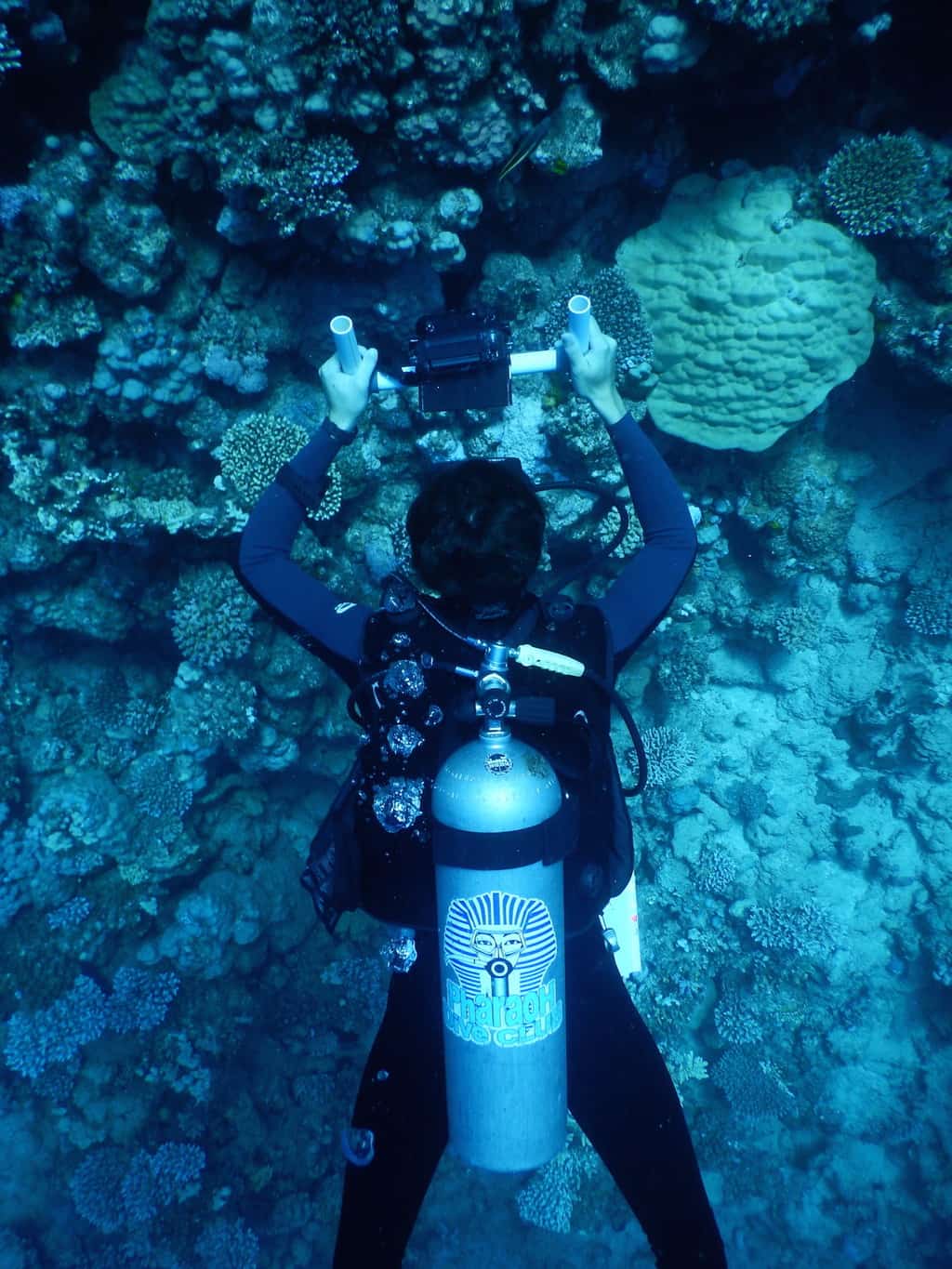
Max ‘scaring’ a freckled hawkfish and recording the outcome in 3D
Aside from the Student expedition we have a number of volunteers with us throughout the summer months. The volunteers work closely with the local community organising clean up dives, beach and mangrove clean ups and educational outreach programmes with local schools and youth groups.
In the next instalment of this blog we will catch up with the volunteers and the students to see what they have been getting up to as well as checking on how the projects are progressing.
Follow the expedition Facebook page at www.facebook.com/GUEgypt2013/ or on twitter @guegypt
You can also visit: www.openoceanproject.org, www.rootsredsea.com and www.pharaohdiveclub.co.uk
Marine Life & Conservation
Paul Watson Released as Denmark Blocks Japan’s Extradition Bid

Renowned anti-whaling activist Paul Watson has been released from custody in Greenland after spending five months in detention. Denmark’s Justice Ministry rejected Japan’s request for his extradition, citing insufficient guarantees that his time already served in custody would be credited against any potential sentence.
The 74-year-old Canadian-American was arrested on July 21 in Nuuk, Greenland’s capital, when his ship docked to refuel. His arrest was based on a 2012 Japanese warrant related to a 2010 encounter in Antarctic waters. Japan alleged Watson obstructed operations and caused damage to a whaling research ship during efforts to disrupt illegal whaling. Watson has consistently denied these claims, maintaining his commitment to marine conservation.
Denmark, which oversees extradition matters for Greenland, concluded that while the legal conditions for extradition were met, the lack of assurances from Japan regarding time-served credit made extradition untenable.
In a video shared by his foundation, Watson expressed gratitude and relief, saying, “After five months, it’s good to be out… and good to know they’re not sending me to Japan.” He added that the most difficult part of his time in custody was being separated from his two young sons.
Watson is a pioneering figure in marine conservation, known for founding the Captain Paul Watson Foundation in 2022 after decades of activism with the Sea Shepherd Conservation Society. His bold efforts to defend marine life have earned him widespread support, including from celebrities and conservationists. His work has also been featured in the acclaimed reality TV series Whale Wars.
Watson’s lawyer, Jonas Christoffersen, praised the decision, stating, “We are happy and relieved that Paul Watson is now free.” He added that Watson is eager to reunite with his family and continue his vital work.
The arrest occurred while Watson’s vessel, the M/Y John Paul DeJoria, was en route to the North Pacific with a team of 26 volunteers to intercept a Japanese whaling ship. His foundation described the arrest as politically motivated and emphasized that Watson’s actions were focused on ending illegal whaling practices.
Japan resumed commercial whaling in 2019 after leaving the International Whaling Commission, asserting that whale meat is a cultural tradition. Conservationists, however, continue to challenge these practices, highlighting their impact on marine ecosystems.
Despite the challenges, Watson remains steadfast in his mission to protect marine life and bring attention to whaling practices. His dedication to ocean conservation has made him a globally respected advocate for the environment.
Marine Life & Conservation
12 Days of Zero-Waste Fish-mas

This holiday period, the Marine Conservation Society, the UK’s leading ocean membership charity, invites you to make some simple changes to eating fish this Christmas to help our seas.
Dr Kenneth Bodles, Head of Fisheries and Aquaculture at the Marine Conservation Society, said, “During the festive season, our consumption increases, but so does waste. Sustainability isn’t just about where food comes from – it’s also about how you use it. By reducing waste and making the most out of your seafood, you’re not only taking steps to be more ocean-friendly, but can also help to cut costs during what is often one of the most expensive times of the year”.
The Marine Conservation Society has compiled twelve tips on how to consume seafood sustainably with zero-waste this Christmas:
Buy whole fish instead of fillets
Instead of fillets, consider buying whole fish such as salmon, hake, or lemon sole. By adopting a “nose to tail” approach with cooking, whole-baked fish not only feeds a crowd, but also helps to minimise waste and maximise sustainability by using up every part of the animal, including bones, skin, and fat.
Make fish stock
Leftover fish bones or shells can be put to good use by boiling them to make a nourishing fish stock or bisque. This can be frozen and preserved for later use and makes for a flavourful base in a soup.
Make your own fish pâté
Avoid waste by turning leftover fish, such as smoked mackerel or salmon, into a delicious pâté by blending with cream cheese and lemon. Perfect when paired with crackers.
The sustainability of salmon and mackerel varies depending on where and how it is caught or farmed. For more information on green-rated options, check the charity’s Good Fish Guide.
Buy frozen
By purchasing seafood that is frozen or vacuum-packed, this helps to reduce waste by extending the shelf life of your food.
Fish pie
If you’re wondering what to do with leftover cooked fish, why not opt for a classic fish pie with mashed potatoes, leeks, and a cheesy sauce? A sure crowd pleaser on Boxing Day.
Use the head
Don’t forget the fish head! The meat is incredibly tender and flavourful. The charity recommends a cod’s head curry or recreating Fallow’s renowned cod’s head in siracha butter.
By stretching your ingredients further, not only is this a more sustainable way to enjoy seafood, but also cost-effective by repurposing leftovers and cooking creatively.
Boxing Day brunch
Mix leftover kippers or smoked salmon with scrambled eggs for a tasty, zero-waste, Boxing Day brunch.
For best choice, make sure you buy kippers, or herring, from the North Sea and the North Irish Sea.
Zero-waste storage
A top tip from the Marine Conservation Society to avoid waste is freezing fish offcuts to save for future use.
Crisp up the skin
Even leftover fish skin can be turned into a quick savoury snack by crisping it up in an air fryer with a little olive oil and salt.
Anchovies two ways
Leftover anchovies can either be blended with butter to make a delicious anchovy butter or tossed into pasta for a hit of umami flavour.
The charity recommends opting for anchovies caught in the Bay of Biscay for best choice.
Fishcakes
For an easy, zero-waste meal, leftover seafood trimmings can be mixed with mash and fried in breadcrumbs to make fishcakes.
Pickled mussels
Try pickling mussels in 1:1 vinegar and water, with a dash of sugar for a sustainable, zero-waste snack that can be enjoyed well beyond the festive season.
Mussels farmed in the UK are a seafood superhero. Grown using low-impact methods and harvested by hand, they get all the food they need from the sea around them. This makes them one of the most sustainable, ocean-friendly, and cost-effective seafood options.
Players of People’s Postcode Lottery have raised £6.6M towards the Marine Conservation Society’s vital work in making seafood more sustainable.
Laura Chow, Head of Charities at People’s Postcode Lottery, said: “Fish is a festive favourite for many, but making sustainable choices when it comes to how we buy and eat seafood makes all the difference for our ocean. Support from players of People’s Postcode Lottery has helped the Marine Conservation Society further its sustainable seafood work, so that we can all enjoy healthier, better protected seas.”
The Marine Conservation Society encourages you to make sustainable seafood choices a year-round habit, not just for Christmas. To check how sustainable the seafood on your plate is, you can visit the charity’s Good Fish Guide. The Guide helps consumers and businesses identify the most sustainable seafood using a simple traffic light system, based on where and how species are caught or farmed. Green is the best choice, amber means improvements are needed, and red indicates fish to avoid buying.
Zero-waste gift idea
Why not embrace a zero-waste Christmas by gifting a membership to support marine conservation? It’s a meaningful, low-waste gift that helps protect our ocean for generations to come. Memberships start from as little as £5 a month – the price of a sandwich and drink from your local coffee shop.
Find the latest sustainable seafood advice for wild-caught and farmed seafood on the Good Fish Guide, downloadable to your phone from www.mcsuk.org/goodfishguide.
-

 News2 months ago
News2 months agoIconic SS United States to become the World’s Largest Artificial Reef
-

 News3 months ago
News3 months agoBook Review – 52 Assignments: Underwater Photography
-

 Gear News3 months ago
Gear News3 months agoDYNAMICNORD – New German diving brand enters the British market
-

 News3 months ago
News3 months agoExploring Cenote El Pit: A Diver’s Dream
-

 Gear News3 months ago
Gear News3 months agoTry BARE drysuits (and maybe even win one!) this Friday with Sea & Sea at North West Dive Fest
-

 Marine Life & Conservation3 months ago
Marine Life & Conservation3 months agoBook Review: Coral Triangle Cameos
-

 Blogs2 months ago
Blogs2 months agoDive the Egyptian Red Sea this Autumn with Regaldive
-

 News3 months ago
News3 months ago2024 Ocean Art Underwater Photo Competition Announced















